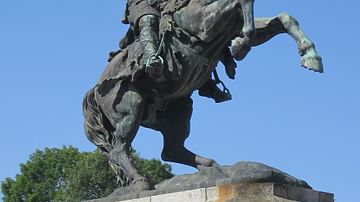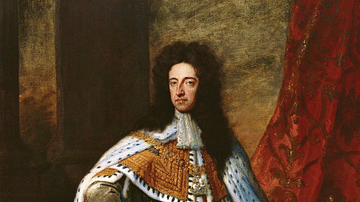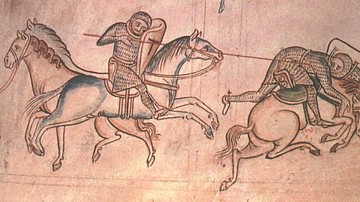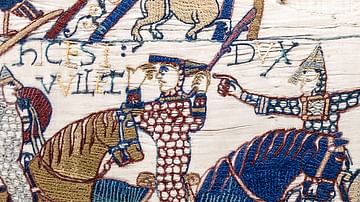Search
Search Results

Definition
William the Conqueror
William the Conqueror (c. 1027-1087), also known as William, Duke of Normandy, led the Norman Conquest of England in 1066 when he defeated and killed his rival Harold Godwinson at the Battle of Hastings. Crowned King William I of England...

Definition
Hipparchia of Maroneia
Hipparchia of Maroneia (l. c. 350-280 BCE) was a Cynic philosopher who rejected her upper-class life to live her beliefs and share her values on the streets of ancient Athens. She was the wife of the Cynic Crates of Thebes (l. c. 360-280...

Definition
William III of England
William III of England (also William II of Scotland, r. 1689-1702) became king of England, Scotland, and Ireland after the Glorious Revolution of 1688. Protestant William, Prince of Orange, was invited to rule jointly with his wife Mary II...

Video
The Philosophy of Cynicism - William D. Desmond
Explore the ancient Greek philosophy of cynicism, which calls for the rejection of materialism and conformity in favor of a simple life. — In the 4th century BCE, a young Diogenes of Sinope was found to be counterfeiting coins...

Definition
William the Silent
William the Silent (l. 1533-1584, also known as William of Orange) was the leader of the Dutch Revolt (the Eighty Years' War) in the Netherlands; first politically (between 1559-1568) then militarily (between 1568-1584). He is among the most...

Definition
William II of England
William II of England, sometimes called William 'Rufus' for his red hair and complexion, reigned as the king of England from 1087 to 1100 CE. The son of William the Conqueror (r. 1066-1087 CE), the younger William was loyal to his father...

Definition
Sir William Marshal
The Englishman Sir William Marshal (c. 1146-1219 CE, aka William the Marshal), Earl of Pembroke, is one of the most celebrated knights of the Middle Ages. Renowned for his fighting skills, he remained undefeated in tournaments, spared the...

Definition
William I of Scotland
William I of Scotland, also known as 'William the Lion' after his heraldic emblem, reigned from 1165 to 1214 CE. Succeeding his elder brother Malcolm IV of Scotland (r. 1153-1165 CE), William was faced with a shrinking kingdom, but he harboured...

Article
William the Conqueror's Harrying of the North
By the end of 1066 CE William the Conqueror had won a decisive victory at the Battle of Hastings, subdued the south-east of England and been crowned King William I in Westminster Abbey but there remained rebellion in the air throughout 1067...

Video
Antisthenes & the Cynics
Founded by Antisthenes, a student of Socrates, the Cynics would be a minor philosophical school throughout the Greco-Roman classical period. Famous for their obscenity, asceticism and virtue they challenged convention and influenced the later...